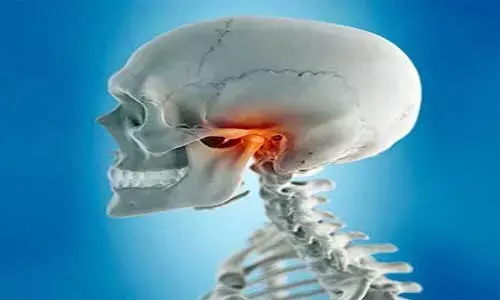- Home
- Medical news & Guidelines
- Anesthesiology
- Cardiology and CTVS
- Critical Care
- Dentistry
- Dermatology
- Diabetes and Endocrinology
- ENT
- Gastroenterology
- Medicine
- Nephrology
- Neurology
- Obstretics-Gynaecology
- Oncology
- Ophthalmology
- Orthopaedics
- Pediatrics-Neonatology
- Psychiatry
- Pulmonology
- Radiology
- Surgery
- Urology
- Laboratory Medicine
- Diet
- Nursing
- Paramedical
- Physiotherapy
- Health news
- Fact Check
- Bone Health Fact Check
- Brain Health Fact Check
- Cancer Related Fact Check
- Child Care Fact Check
- Dental and oral health fact check
- Diabetes and metabolic health fact check
- Diet and Nutrition Fact Check
- Eye and ENT Care Fact Check
- Fitness fact check
- Gut health fact check
- Heart health fact check
- Kidney health fact check
- Medical education fact check
- Men's health fact check
- Respiratory fact check
- Skin and hair care fact check
- Vaccine and Immunization fact check
- Women's health fact check
- AYUSH
- State News
- Andaman and Nicobar Islands
- Andhra Pradesh
- Arunachal Pradesh
- Assam
- Bihar
- Chandigarh
- Chattisgarh
- Dadra and Nagar Haveli
- Daman and Diu
- Delhi
- Goa
- Gujarat
- Haryana
- Himachal Pradesh
- Jammu & Kashmir
- Jharkhand
- Karnataka
- Kerala
- Ladakh
- Lakshadweep
- Madhya Pradesh
- Maharashtra
- Manipur
- Meghalaya
- Mizoram
- Nagaland
- Odisha
- Puducherry
- Punjab
- Rajasthan
- Sikkim
- Tamil Nadu
- Telangana
- Tripura
- Uttar Pradesh
- Uttrakhand
- West Bengal
- Medical Education
- Industry
Oral cavity resection, mandibulectomy predisposes to surgical site infection: Study

Oral cavity resections, mandibulectomy predisposes to surgical site infection (SSI), reports a recent study.
Konagalla Karthik and Muthuswamy Dhiwakar from the Department of Otolaryngology-Head and Neck Surgery, Kovai Medical Center and Hospital, Coimbatore, India conducted this reported study to identify risk factors for surgical site infection (SSI) and pneumonia following oral cavity tumor surgery.
The study is published in the Journal of the Sciences and Specialities of the Head and Neck.
Cancer of the oral cavity is one of the most common malignancies, especially in developing countries, but also in the developed world. Squamous cell carcinoma (SCC) is the most common histology and the main etiological factors are tobacco and alcohol use.
Although early diagnosis is relatively easy, presentation with advanced disease is not uncommon. The standard of care is primary surgical resection with or without postoperative adjuvant therapy. Improvements in surgical techniques combined with the routine use of postoperative radiation or chemoradiation therapy have resulted in improved survival statistics over the past decade. Successful treatment of patients with oral cancer is predicated on multidisciplinary treatment strategies to maximize oncologic control and minimize impact of therapy on form and function.
The authors carried out a retrospective chart review of a consecutive series of patients undergoing oral cavity resection where several clinicopathologic variables were tested for their association with SSI and pneumonia.
The results of the study revealed the following-
- Three hundred and forty-four cases in 330 patients were included.
- Incidence of SSI and pneumonia was 67 (19.5%) and 38 (11%), respectively.
- On multivariate analysis, marginal mandibulectomy and segmental mandibulectomy were independent risk factors for SSI, whereas time under anesthesia (TUA) was an independent risk factor for pneumonia.
- Receiver operating characteristic curve identified 390 min as the cutoff above which pneumonia was predicted with a high degree of accuracy.
Therefore, the authors concluded that "in oral cavity resections, mandibulectomy predisposes to SSI. Further, prolonged TUA (>390 min) is a powerful predictor for pneumonia."
As it is a modifiable risk factor, reduction in TUA might correspondingly lower the incidence of postoperative pneumonia, they added.
Dr. Nandita Mohan is a practicing pediatric dentist with more than 5 years of clinical work experience. Along with this, she is equally interested in keeping herself up to date about the latest developments in the field of medicine and dentistry which is the driving force for her to be in association with Medical Dialogues. She also has her name attached with many publications; both national and international. She has pursued her BDS from Rajiv Gandhi University of Health Sciences, Bangalore and later went to enter her dream specialty (MDS) in the Department of Pedodontics and Preventive Dentistry from Pt. B.D. Sharma University of Health Sciences. Through all the years of experience, her core interest in learning something new has never stopped. She can be contacted at editorial@medicaldialogues.in. Contact no. 011-43720751
Dr Kamal Kant Kohli-MBBS, DTCD- a chest specialist with more than 30 years of practice and a flair for writing clinical articles, Dr Kamal Kant Kohli joined Medical Dialogues as a Chief Editor of Medical News. Besides writing articles, as an editor, he proofreads and verifies all the medical content published on Medical Dialogues including those coming from journals, studies,medical conferences,guidelines etc. Email: drkohli@medicaldialogues.in. Contact no. 011-43720751


